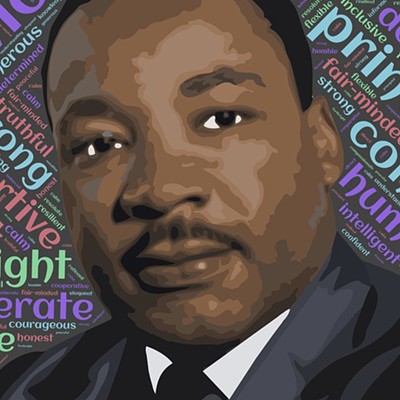CAPITALISM: A LOVE STORY
**1/2
It goes without saying that Michael Moore's latest documentary, Capitalism: A Love Story, hardly shows the United States of America at its best. The sobering afterthought is that it hardly shows Michael Moore at his best, either. Easily the controversial filmmaker's weakest nonfiction piece to date, Capitalism contains many powerful sequences yet ultimately is too scattershot to serve as effective agitprop.
Tackling the subject of capitalism is even more daunting than tackling the subject of health care (as he did so expertly in Sicko), and Moore is unable to coalesce all the different chapters of his odyssey into a cohesive whole. Using home-movie footage from his own comfortable middle-class existence as a child, he shows how the basic tenets of this economic system allowed everyone in the postwar decades to take part in the American Dream, with the country only truly going to hell once Ronald Reagan and his puppetmasters arrived on the scene.
From here, Moore jumps all over the place: watching ordinary folks being thrown out of their lifelong homes by the evil banking industry; chatting with erudite actor-playwright Wallace Shawn about economics; detailing how various people (including a judge) were getting rich by throwing typical teens into a juvenile detention center for offenses as minor as hurling a piece of meat across the dinner table; noting how many banking-industry officials have been a key part of the past few administrations; and examining the clandestine bank bailouts.
This is all well and good, but we already knew most of these stories from even just cursory glances at newspapers and news blogs, and more than ever, we get the sense that Moore is preaching to the choir with no real inclination to expand his audience (admittedly, he's such a polarizing figure that it's hard to imagine anyone not already having an opinion of him). This isn't to say that Capitalism: A Love Story doesn't succeed in some areas. Moore reminds us that Franklin Roosevelt was one of our great presidents (via invaluable newsreel footage showing FDR proposing a second Bill of Rights that would have guaranteed Americans, among other benefits, universal health care) while Reagan and George W. Bush were among our worst. Yet even here, the filmmaker gets carried away, treating Barack Obama's election (as presented by Moore, the only thing missing is a heavenly choir) as the turning point back toward a respectable and compassionate society. (Uh, wake me when this actually happens.)
Moore's on-camera antics are still moderately amusing but increasingly reveal that he needs new material rather than repeating the same old schtick of, say, walking up to the office building of an important person and trying to gain access that he knows ahead of time won't be granted. As always, he's at his best when he gets the hell out of the way and lets average citizens have their say. These are the moments that alternately provide the most inspiration, such as tracking a profitable company run solely by its own employees, and the most outrage, as in a heartbreaking discussion of how numerous despicable corporations (among them Wal-Mart, Bank of America and AT&T) take out what they call "Dead Peasant" insurance policies, collecting giant sums when one of their employees dies (they prefer the deceased young and female, since that yields the greatest financial rewards).
By the end of the picture, Moore takes to the streets, brandishing the verbal equivalent of a shotgun and calling for the end of capitalism. Yet even his own footage at the beginning of the film suggests that the problem isn't capitalism itself but rather capitalism as it's abused by those in charge. Moore means well, but in this case, he seems to have used that metaphorical shotgun to shoot himself in the foot.
ZOMBIELAND
***
What's with this unlikely epidemic of good zombie flicks? Now here's another one. The blood flows freely in this gonzo horror tale, but, more importantly, so do the laughs. And while the humor may be frosty around the edges, it's never downright mean-spirited, thanks in part to a director (Ruben Fleischer) with a light touch, two screenwriters (Rhett Reese and Paul Wernick) who have obviously done their zombie-film homework and humorously place the rules for survival front and center (they include keeping fit, being weary of bathrooms, and always wearing seat belts), and four actors (five, if you include the A-lister who turns up in a crowd-pleasing cameo) who remain ingratiating throughout. Jesse Eisenberg, giving up Adventureland for Zombieland, plays the lovably geeky Columbus, while Emma Stone and Abigail Breslin are savvy survivalist sisters Wichita and Little Rock. Yet it's Woody Harrelson, all rolling thunder as kick-ass cowboy Tallahassee, who makes the biggest impact. In a wild and wide-eyed performance, he stops just short of completely chewing the scenery -- even the zombies aren't capable of matching his ferocious bite.
WHIP IT
***
Despite the title, you won't find any Devo on Whip It's soundtrack, but the Ramones and .38 Special both make vocal appearances in this film that marks the directorial debut of Drew Barrymore. If those two songs ("Sheena Is a Punk Rocker" and "Caught Up in You," respectively) made the journey from Drew's iPod to the big screen, more power to them, as they're certainly in tune with the rock & roll aesthetic on display throughout this rowdy, rebellious film. Juno's Ellen Page once again flashes her impressive acting chops, this time playing Bliss Cavendar, a 17-year-old whose mother (Marcia Gay Harden) is hellbent on entering her in every beauty pageant that pops up anywhere near their rundown Texas town. But Bliss eventually finds her true calling when she discovers the sport of roller derby: Adopting the name Babe Ruthless, she lands a second family in the form of her sisters on skates (played by, among others, Kristen Wiig as Maggie Mayhem and Barrymore as Smashley Simpson). The trappings are all familiar -- a disapproving parent, a competitive rival (Juliette Lewis as hard-as-nails Iron Maven), scheduling conflicts, and the climactic championship match -- but in the capable hands of Barrymore and scripter Shauna Cross (adapting her own novel, Derby Girl), they're all given a fresh coat of paint that allows the movie to easily skate by on the charms of both its novel setting and its gung-ho cast.
BIG FAN
***
Robert D. Siegel, who wrote the original screenplay for last year's superb drama The Wrestler, now makes his directorial debut with a picture that shifts the spotlight from the sports arena to the stands. Big Fan's protagonist is Paul Aufiero (Patton Oswalt), who considers himself nothing less than the New York Giants' most ardent supporter ... ever. Now in his mid-30s, Paul is perfectly OK with living at home with his exasperated mother (Marcia Jean Kurtz), staying away from members of the opposite sex, and working a dead-end job as a parking attendant. Aside from the occasional masturbatory session under the sheets, his only pastimes are watching Giants games with his friend Sal (Kevin Corrigan) and religiously calling into a nightly sports-radio station to offer opinions which he's scrupulously scripted ahead of time. All runs smoothly in Paul's insulated bubble until the night he spots his favorite Giant, linebacker Quantrell Bishop (Jonathan Hamm), and gets up the nerve to talk to him. The encounter lands Paul in the hospital and Quantrell on the NFL's suspension list, but Paul ultimately isn't too worried about his own well-being; more importantly, he wonders how this distracting incident will affect the rest of the Giants' season. The cult of organized sports often requires many sacrifices from its diehard devotees -- of time (for starters, that Fantasy Football can sure eat up weekends!), money, even family. Siegel's picture takes it to the extreme, examining the outer reaches of this particular mode of hero worship and the psychological impact of sacrificing one's entire life to something that yields limited dividends. Big Fan stretches credulity in spots, but for the most part, it manages to keep its eye on the ball.

























